Story - Prototype
Story by Maura Sullivan Hill • Photos by Lukas Keapproth
NEW STUDENTS AT LOYOLA UNIVERSITY CHICAGO IN NEED OF GUIDANCE often find their way to the office of Ashley Williams. As associate director for special populations in the Office of New Student Programs, Williams takes pride in helping students adjust to life on campus. But while she and colleague Allen Green may work in a division geared toward new students, they are committed to supporting students throughout their entire journey at the University.
“We provide what I call ‘intrusive advising support,’” Williams says. “We want to help our students develop help-seeking behaviors from the beginning [of their time at Loyola]. Our goal is to keep our students connected to their faith and Jesuit traditions, while also providing academic support through graduation. We’re spending time with students across their four years, providing them with advising and directing them to important resources on campus.”
Both Williams and Green support students through one-on-one mentoring and by connecting them with tutoring services or study groups, as well as running affinity groups to help the students create community and make connections. During the mentoring sessions, they help students create an academic plan that will help them complete their degree requirements while also getting involved in the Loyola community. Williams and Green also provide resources to family members, from when they first meet them at orientation and beyond. They even invite families to participate in some of their programming.
“I actually spend some parts of my week talking more to parents than I do to students because we want them to feel they are a part of the students’ community and life here at Loyola,” she says. “It doesn’t end when they send them to us. We know in most cases that it helps the student persist if they receive the same kind of messaging at home that they are receiving on campus.”
The goal of all their work, Williams says, is to demolish any barriers to success that students may encounter.
Our mission [at Loyola] calls us to open more doors, to deepen our experiences, and to instill faith in our students by building their confidence in themselves. Ashley Williams, Associate Director for Special Populations in the Office of New Student Programs
“Our students never leave our space without being asked, ‘So, what are you going to do next?’” Williams says. “We don’t allow students to walk away until they know what their next step is going to be. And it could be simple, like ‘I’m going to go downstairs and talk to financial aid.’ Or it could be setting up a one-on-one meeting with a faculty member to get more out of class. We help our students truly be exceptional in their own way, whatever that means to them.”
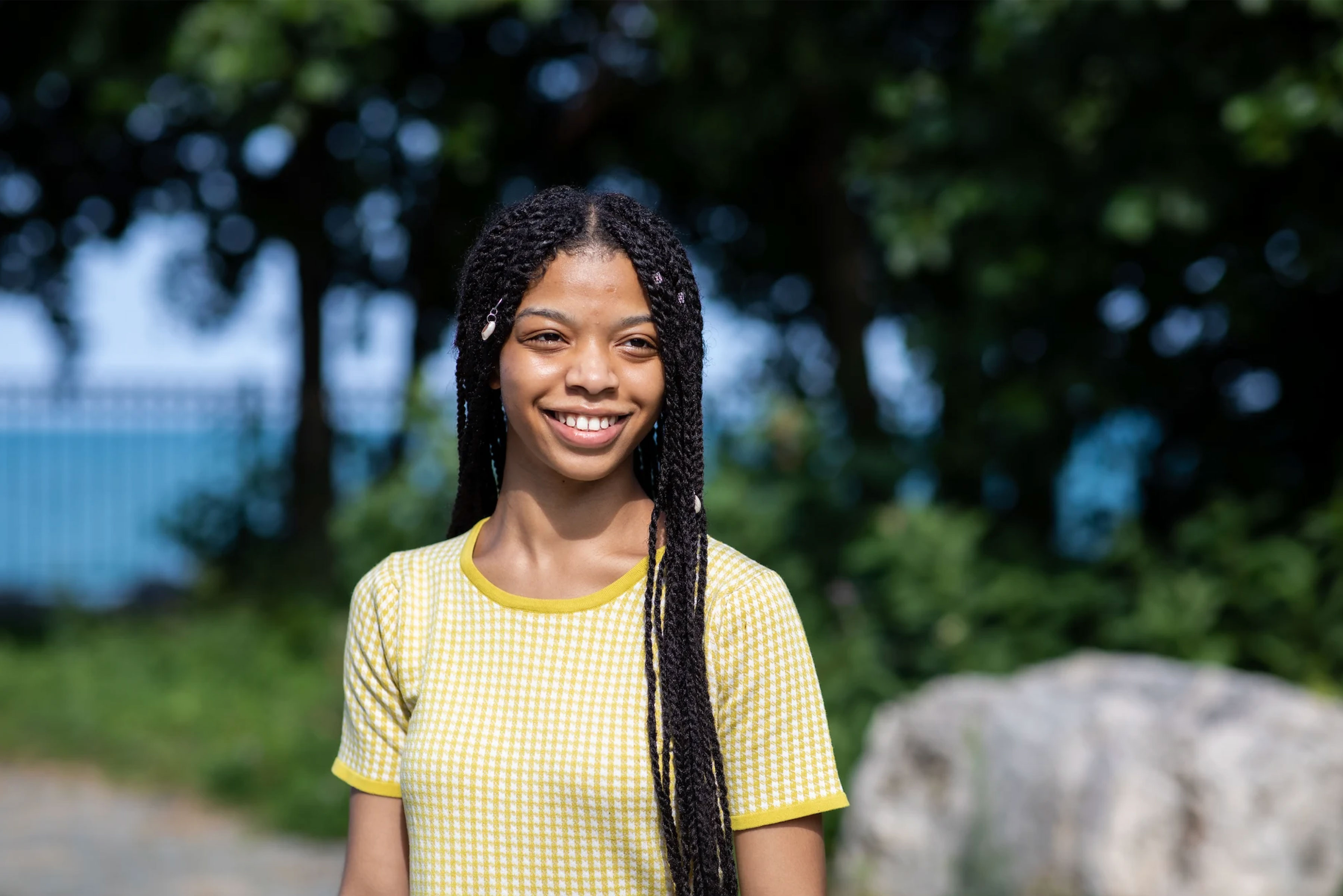
Lorem ipsum dolor sit amet, consectetur adipiscing elit, sed do eiusmod tempor incididunt ut labore et dolore magna aliqua.
Rachel Caldwell
When Rachel Caldwell moved into de Nobili Hall as a first-year student, she immediately felt at home as part of the multicultural living-learning community.
“I was super excited to live in the city and really experience Chicago,” says Caldwell, a native of Dolton, Illinois, a suburb about 19 miles south of the Chicago Loop. “As a Black, female-identifying person, I feel like having a community of support is super important. Loyola is a predominantly white institution, which can be intimidating, but di Nobili having the international and multicultural learning communities made it so much less intimidating. I had all these people supporting me and met people from so many different walks of life. Living there definitely helped make the transition to Loyola a lot easier.”
While dorm life was ideal for Caldwell as a first-year student, she wasn’t quite as sure about her academic plan. She entered Loyola as a biology major with plans to go to medical school but decided to make a change.
“I realized that I was passing my classes, but I didn’t know if I was interested in doing this for the rest of my life,” Caldwell says.
That’s where Williams and Green came in.
“Allen was my advisor for my first and second year, and he told me it was totally normal and okay to have those types of feelings, especially as a first year. [He told me] it is okay to not have everything planned to a T and was supportive of the process as I got a feel for different [classes],” Caldwell recalls. “And then Ashley took me under her wing and said, ‘This is my thing. I got you!’”
Williams helped Caldwell register for classes in areas that interested her, and ultimately Caldwell landed on her human services major, with minors in both psychology and Spanish language and literature. Down the road, she sees herself working in the nonprofit world and pursuing a doctorate in psychology.
”My passion is working with youth and families, definitely marginalized communities, so Black, brown and LGBTQ+ communities that could use more support,” she says.
I’ve been a part of those communities and advocated for those communities all my life, so with post-secondary education under my belt, that’s what I see post-Loyola. Working with the community and doing that type of work—people work is my passion, essentially.
In addition to the team in Special Populations, Caldwell, now in her final year at Loyola, also expresses gratitude for the Student Diversity and Multicultural Affairs office and the Black Cultural Center on campus.
“Not only did they support me academically and push me to work to the best of my abilities at all times, they also allowed for me to make connections that I feel are definitely going to last for a long time, with regard to peers of mine who share similar identities and are coming from similar backgrounds and having similar experiences,” she says.
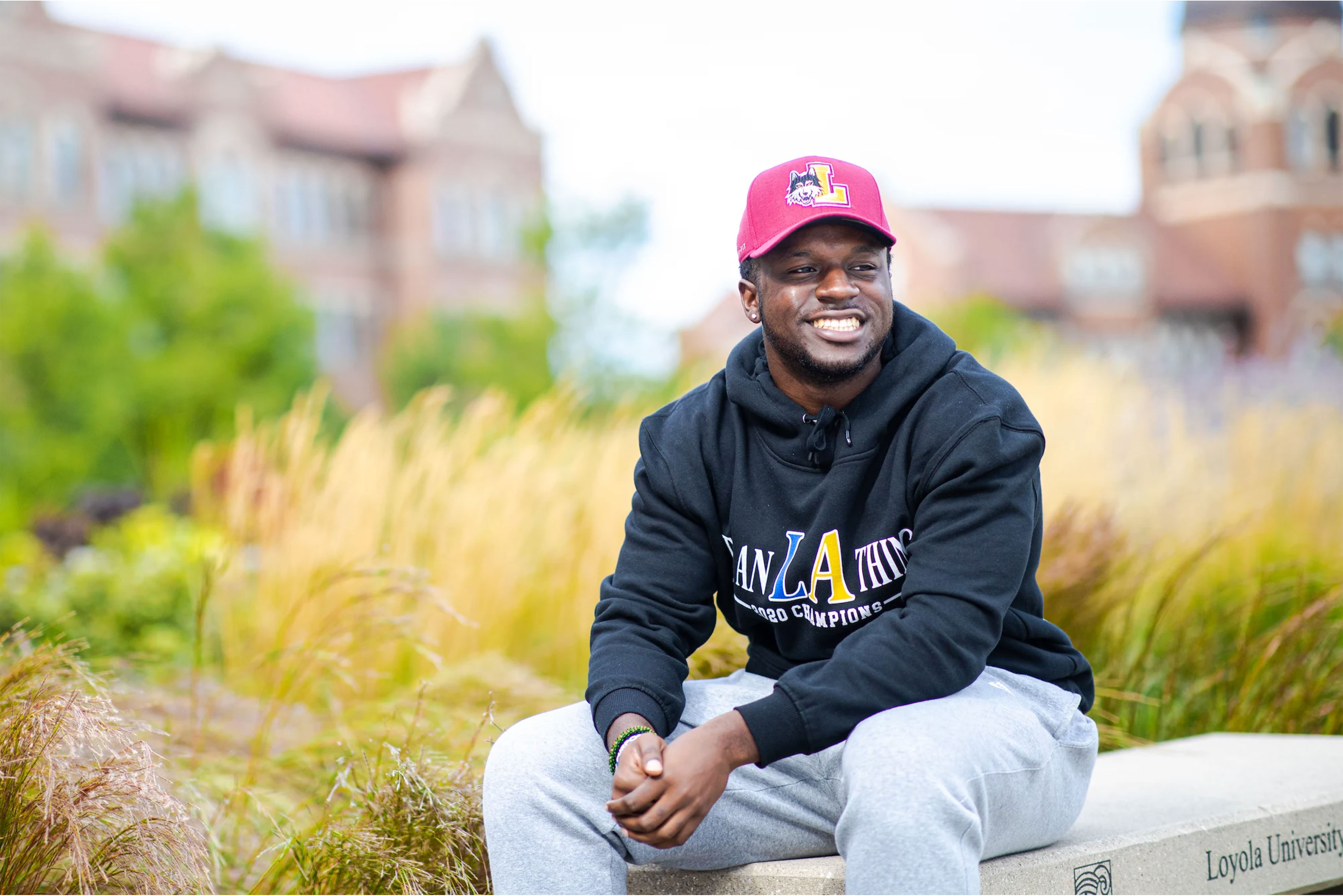
Lorem ipsum dolor sit amet, consectetur adipiscing elit, sed do eiusmod tempor incididunt ut labore et dolore magna aliqua.
Osaze Odiase
Ozaze Odiase, now a junior biology major, describes his first semester at Loyola as a “culture shock.”
“The weather was very life changing, a totally different universe from where I was from,” the Los Angeles native recalls. “Honestly, that was one of the biggest challenges, because I had never seen snow or dealt with any severe weather. Meeting people was a different ball game—a lot of people had different upbringings, different views, ideas, and attitudes. It was just like, ‘Wow, it’s cold, everyone’s different,’ and not in a bad way, but you have to adjust in order to get the most out of a situation, because that’s what college is about.”
And it wasn’t just the weather—he found his biology classes challenging and was also still coming to terms with the death of his older brother the previous year.
Odiase had attended Loyola High School, a Jesuit school in Los Angeles, and the shared Jesuit mission was one of the reasons he chose Loyola University Chicago for college. And here in Chicago, the care for the whole person that is a hallmark of Jesuit education helped Odiase find his footing and begin to thrive at Loyola.
Williams worked with Odiase to plan his schedule and choose courses but also took the time to get to know him outside of his academic work, because what had happened outside the classroom was affecting his grades.
“I let Ms. Williams know that [my brother’s death] was one of the biggest dark clouds over me, because she always wanted to know my story and [help me] study who I am,” he says. “She helped me reflect, and, with that, I was able to understand that I felt really bad because of those issues. She helped me understand that and then through overcoming it, I used it as motivation to do better in school and overcome any negative energy.”
Determined to make a change, Odiase started meeting more people and making friends, including other Californians at Loyola, and taking advantage of tutoring and group study sessions offered through Student Academic Services. The Special Populations office also helped connect him to Loyola-funded resources during the pandemic, when he stayed in his Chicago apartment to do remote learning. Williams steered Odiase towards helpful resources but also empowered him to trust his own instincts.
“I have a good support system now,” Odiase says.
“Ms. Williams, I call her all the time! I get her input on things. She told me what to do and what not to do, but sometimes, she’d challenge me and say, ‘You have to make your own decision and see.’ And that was the most important and helped in the long run.”
During the summer before his junior year, Odiase volunteered at a Kaiser Permanente hospital at home in Los Angeles to gain experience before he applies to medical school. When he moves on from Loyola to med school, he’ll be prepared to tap into resources and seek help on his road to becoming a doctor.
“I was afraid to ask at first and tried to be too cool, but I have become more humble and reach out more,” he says. “And now I’m in a pretty perfect situation.”
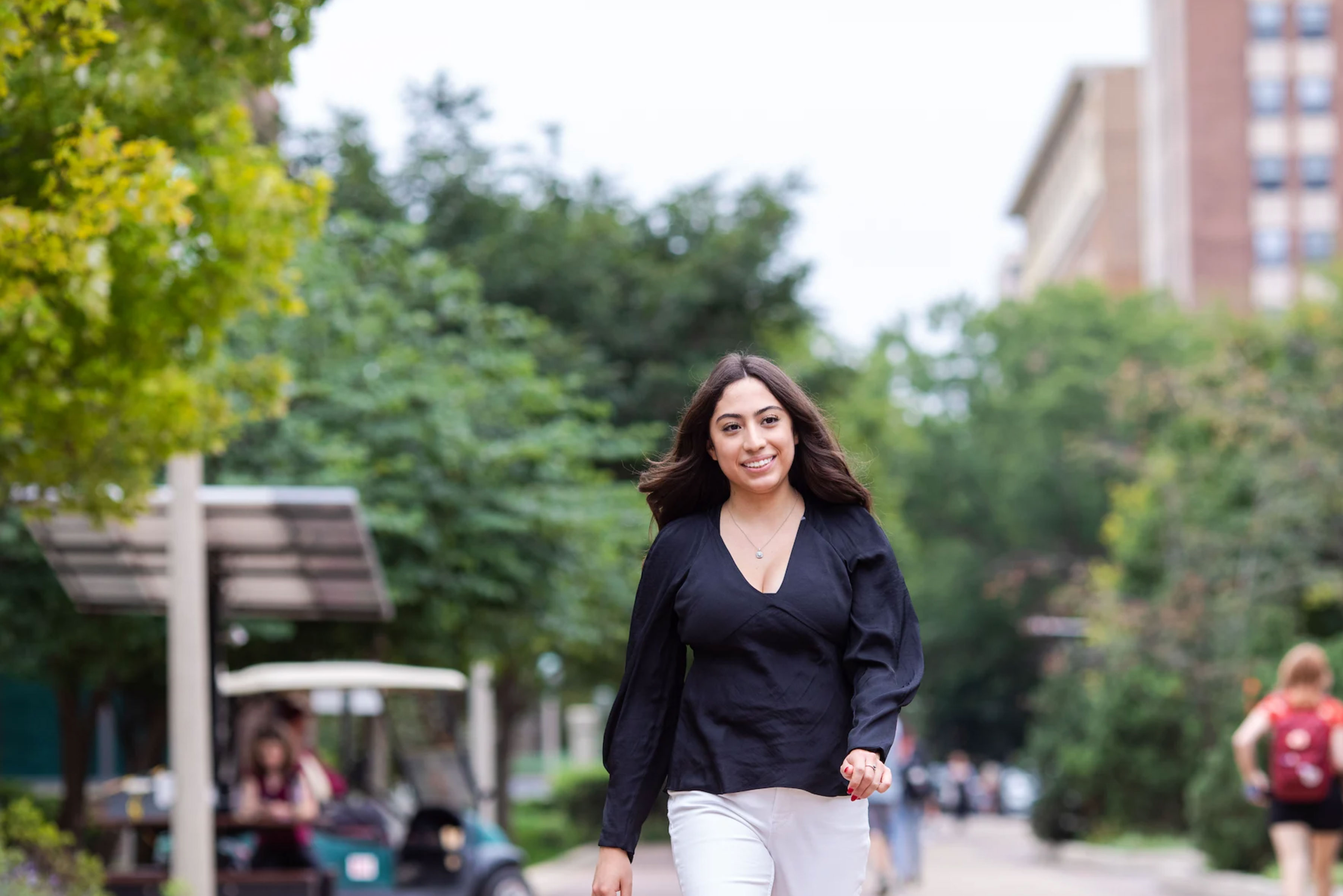
Lorem ipsum dolor sit amet, consectetur adipiscing elit, sed do eiusmod tempor incididunt ut labore et dolore magna aliqua.
Luz Castrejon
When Rachel Caldwell moved into de Nobili Hall as a first-year student, she immediately felt at home as part of the multicultural living-learning community.
“I was super excited to live in the city and really experience Chicago,” says Caldwell, a native of Dolton, Illinois, a suburb about 19 miles south of the Chicago Loop. “As a Black, female-identifying person, I feel like having a community of support is super important. Loyola is a predominantly white institution, which can be intimidating, but di Nobili having the international and multicultural learning communities made it so much less intimidating. I had all these people supporting me and met people from so many different walks of life. Living there definitely helped make the transition to Loyola a lot easier.”
While dorm life was ideal for Caldwell as a first-year student, she wasn’t quite as sure about her academic plan. She entered Loyola as a biology major with plans to go to medical school but decided to make a change.
“I realized that I was passing my classes, but I didn’t know if I was interested in doing this for the rest of my life,” Caldwell says.
That’s where Williams and Green came in.
“Allen was my advisor for my first and second year, and he told me it was totally normal and okay to have those types of feelings, especially as a first year. [He told me] it is okay to not have everything planned to a T and was supportive of the process as I got a feel for different [classes],” Caldwell recalls. “And then Ashley took me under her wing and said, ‘This is my thing. I got you!’”
Williams helped Caldwell register for classes in areas that interested her, and ultimately Caldwell landed on her human services major, with minors in both psychology and Spanish language and literature. Down the road, she sees herself working in the nonprofit world and pursuing a doctorate in psychology.
My passion is working with youth and families, definitely marginalized communities, so Black, brown and LGBTQ+ communities that could use more support,” she says.“
I’ve been a part of those communities and advocated for those communities all my life, so with post-secondary education under my belt, that’s what I see post-Loyola. Working with the community and doing that type of work—people work is my passion, essentially.
In addition to the team in Special Populations, Caldwell, now in her final year at Loyola, also expresses gratitude for the Student Diversity and Multicultural Affairs office and the Black Cultural Center on campus.
“Not only did they support me academically and push me to work to the best of my abilities at all times, they also allowed for me to make connections that I feel are definitely going to last for a long time, with regard to peers of mine who share similar identities and are coming from similar backgrounds and having similar experiences,” she says.
We are called
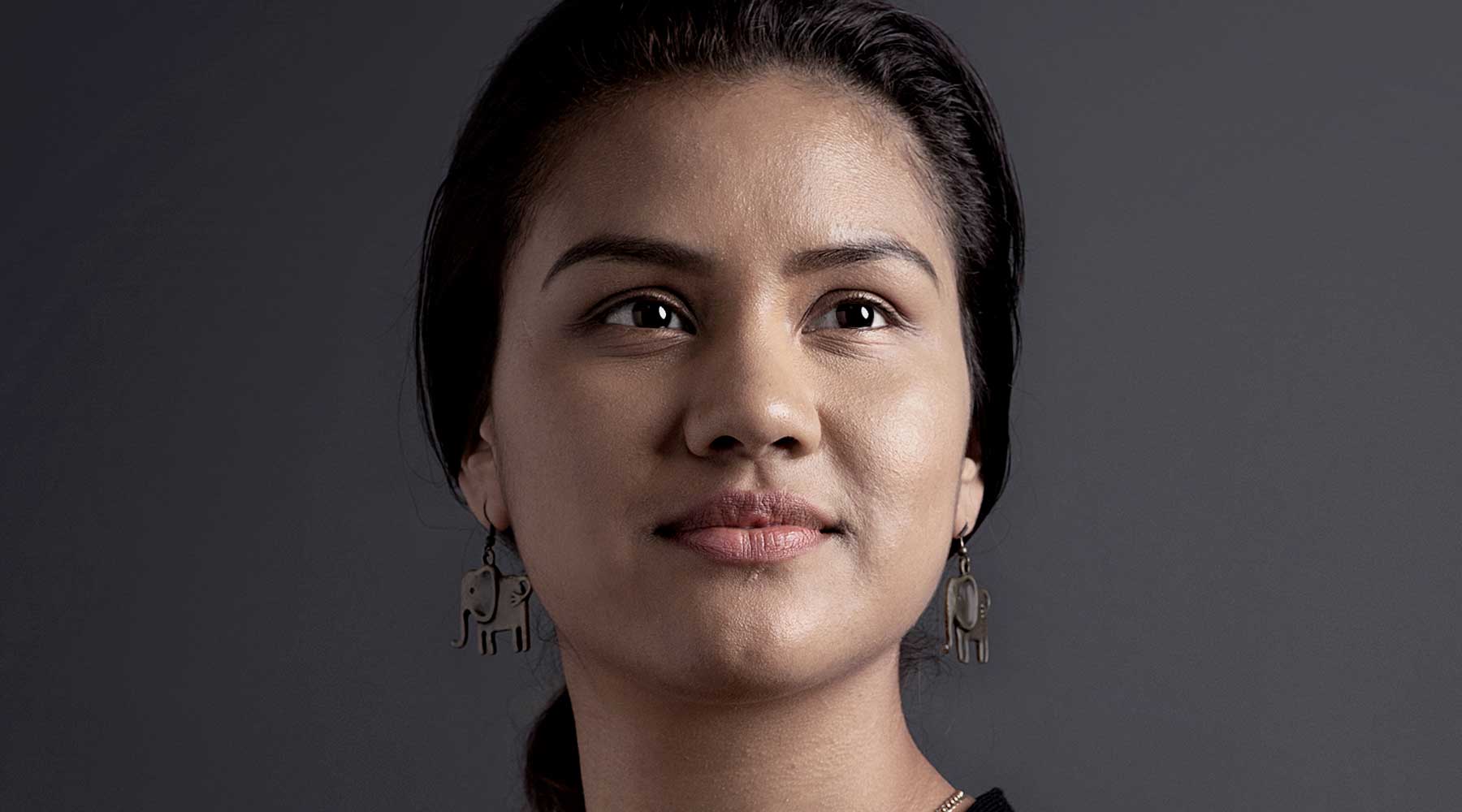
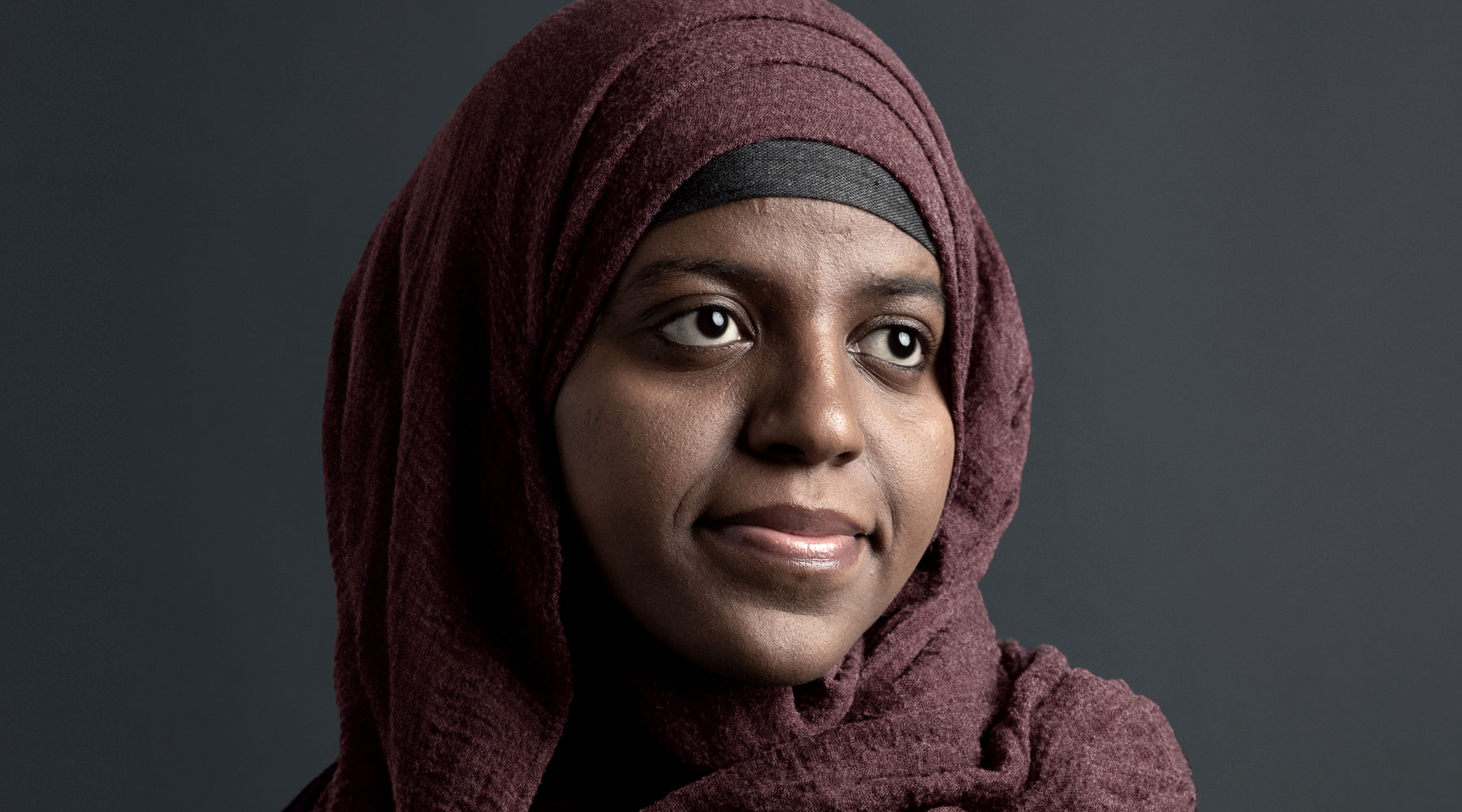

Quinlan School of Business
Trevaughn Latimer
Economics
Hometown calling: An economics major leads for change
Read Story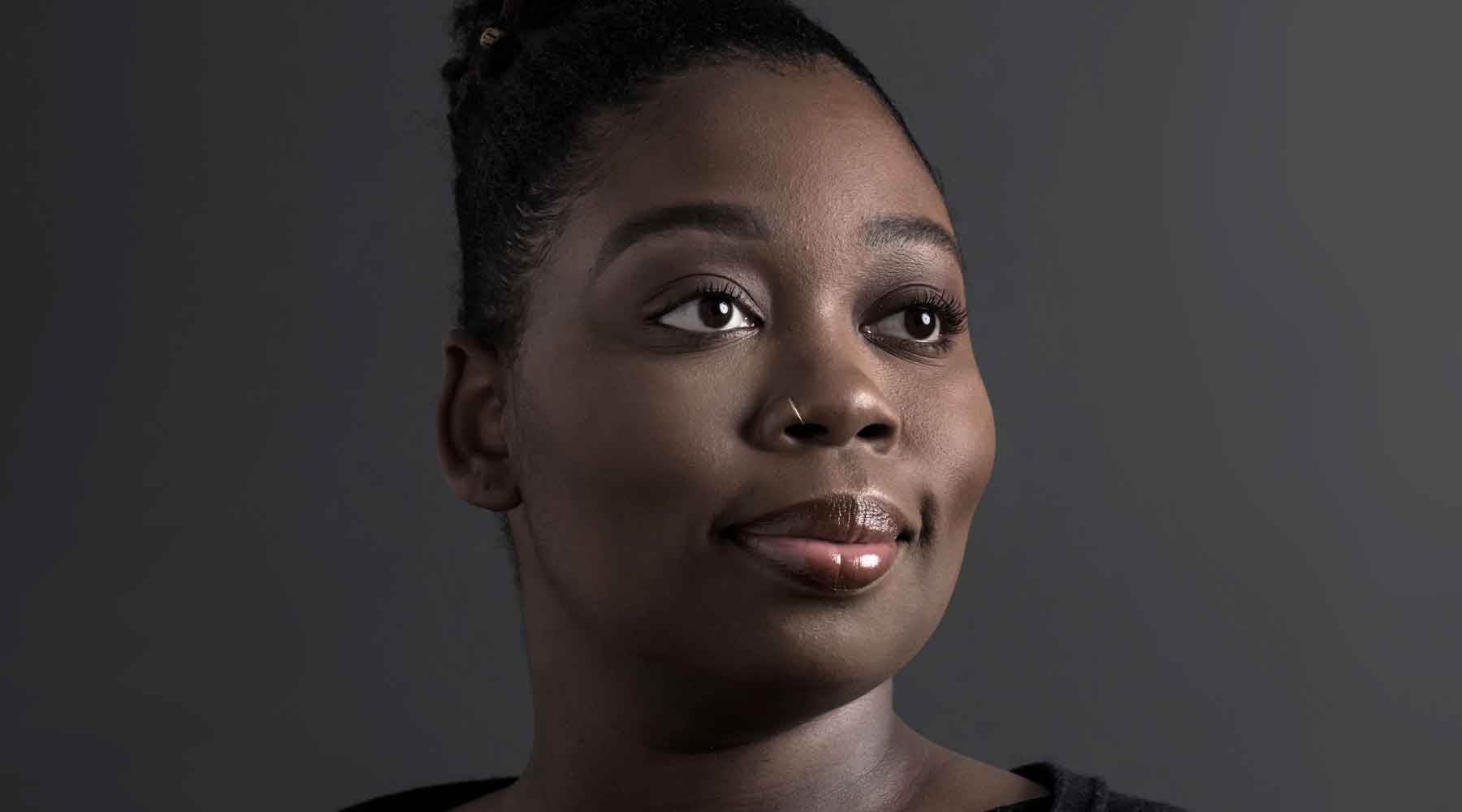
College of Arts and Sciences
Loren McCauley
Psychology
Real-world research in Chicago communities
Read StoryStory by Maura Sullivan Hill • Photos by Lukas Keapproth
NEW STUDENTS AT LOYOLA UNIVERSITY CHICAGO IN NEED OF GUIDANCE often find their way to the office of Ashley Williams. As associate director for special populations in the Office of New Student Programs, Williams takes pride in helping students adjust to life on campus. But while she and colleague Allen Green may work in a division geared toward new students, they are committed to supporting students throughout their entire journey at the University.
“We provide what I call ‘intrusive advising support,’” Williams says. “We want to help our students develop help-seeking behaviors from the beginning [of their time at Loyola]. Our goal is to keep our students connected to their faith and Jesuit traditions, while also providing academic support through graduation. We’re spending time with students across their four years, providing them with advising and directing them to important resources on campus.”
Both Williams and Green support students through one-on-one mentoring and by connecting them with tutoring services or study groups, as well as running affinity groups to help the students create community and make connections. During the mentoring sessions, they help students create an academic plan that will help them complete their degree requirements while also getting involved in the Loyola community. Williams and Green also provide resources to family members, from when they first meet them at orientation and beyond. They even invite families to participate in some of their programming.
“I actually spend some parts of my week talking more to parents than I do to students because we want them to feel they are a part of the students’ community and life here at Loyola,” she says. “It doesn’t end when they send them to us. We know in most cases that it helps the student persist if they receive the same kind of messaging at home that they are receiving on campus.”
The goal of all their work, Williams says, is to demolish any barriers to success that students may encounter.
“Our students never leave our space without being asked, ‘So, what are you going to do next?’” Williams says. “We don’t allow students to walk away until they know what their next step is going to be. And it could be simple, like ‘I’m going to go downstairs and talk to financial aid.’ Or it could be setting up a one-on-one meeting with a faculty member to get more out of class. We help our students truly be exceptional in their own way, whatever that means to them.”
When Rachel Caldwell moved into de Nobili Hall as a first-year student, she immediately felt at home as part of the multicultural living-learning community.
“I was super excited to live in the city and really experience Chicago,” says Caldwell, a native of Dolton, Illinois, a suburb about 19 miles south of the Chicago Loop. “As a Black, female-identifying person, I feel like having a community of support is super important. Loyola is a predominantly white institution, which can be intimidating, but di Nobili having the international and multicultural learning communities made it so much less intimidating. I had all these people supporting me and met people from so many different walks of life. Living there definitely helped make the transition to Loyola a lot easier.”
While dorm life was ideal for Caldwell as a first-year student, she wasn’t quite as sure about her academic plan. She entered Loyola as a biology major with plans to go to medical school but decided to make a change.
“I realized that I was passing my classes, but I didn’t know if I was interested in doing this for the rest of my life,” Caldwell says.
That’s where Williams and Green came in.
“Allen was my advisor for my first and second year, and he told me it was totally normal and okay to have those types of feelings, especially as a first year. [He told me] it is okay to not have everything planned to a T and was supportive of the process as I got a feel for different [classes],” Caldwell recalls. “And then Ashley took me under her wing and said, ‘This is my thing. I got you!’”
Williams helped Caldwell register for classes in areas that interested her, and ultimately Caldwell landed on her human services major, with minors in both psychology and Spanish language and literature. Down the road, she sees herself working in the nonprofit world and pursuing a doctorate in psychology.
”My passion is working with youth and families, definitely marginalized communities, so Black, brown and LGBTQ+ communities that could use more support,” she says.
I’ve been a part of those communities and advocated for those communities all my life, so with post-secondary education under my belt, that’s what I see post-Loyola. Working with the community and doing that type of work—people work is my passion, essentially.
In addition to the team in Special Populations, Caldwell, now in her final year at Loyola, also expresses gratitude for the Student Diversity and Multicultural Affairs office and the Black Cultural Center on campus.
“Not only did they support me academically and push me to work to the best of my abilities at all times, they also allowed for me to make connections that I feel are definitely going to last for a long time, with regard to peers of mine who share similar identities and are coming from similar backgrounds and having similar experiences,” she says.
Ozaze Odiase, now a junior biology major, describes his first semester at Loyola as a “culture shock.”
“The weather was very life changing, a totally different universe from where I was from,” the Los Angeles native recalls. “Honestly, that was one of the biggest challenges, because I had never seen snow or dealt with any severe weather. Meeting people was a different ball game—a lot of people had different upbringings, different views, ideas, and attitudes. It was just like, ‘Wow, it’s cold, everyone’s different,’ and not in a bad way, but you have to adjust in order to get the most out of a situation, because that’s what college is about.”
And it wasn’t just the weather—he found his biology classes challenging and was also still coming to terms with the death of his older brother the previous year.
Odiase had attended Loyola High School, a Jesuit school in Los Angeles, and the shared Jesuit mission was one of the reasons he chose Loyola University Chicago for college. And here in Chicago, the care for the whole person that is a hallmark of Jesuit education helped Odiase find his footing and begin to thrive at Loyola.
Williams worked with Odiase to plan his schedule and choose courses but also took the time to get to know him outside of his academic work, because what had happened outside the classroom was affecting his grades.
“I let Ms. Williams know that [my brother’s death] was one of the biggest dark clouds over me, because she always wanted to know my story and [help me] study who I am,” he says. “She helped me reflect, and, with that, I was able to understand that I felt really bad because of those issues. She helped me understand that and then through overcoming it, I used it as motivation to do better in school and overcome any negative energy.”
Determined to make a change, Odiase started meeting more people and making friends, including other Californians at Loyola, and taking advantage of tutoring and group study sessions offered through Student Academic Services. The Special Populations office also helped connect him to Loyola-funded resources during the pandemic, when he stayed in his Chicago apartment to do remote learning. Williams steered Odiase towards helpful resources but also empowered him to trust his own instincts.
“I have a good support system now,” Odiase says.
“Ms. Williams, I call her all the time! I get her input on things. She told me what to do and what not to do, but sometimes, she’d challenge me and say, ‘You have to make your own decision and see.’ And that was the most important and helped in the long run.”
During the summer before his junior year, Odiase volunteered at a Kaiser Permanente hospital at home in Los Angeles to gain experience before he applies to medical school. When he moves on from Loyola to med school, he’ll be prepared to tap into resources and seek help on his road to becoming a doctor.
“I was afraid to ask at first and tried to be too cool, but I have become more humble and reach out more,” he says. “And now I’m in a pretty perfect situation.”
When Rachel Caldwell moved into de Nobili Hall as a first-year student, she immediately felt at home as part of the multicultural living-learning community.
“I was super excited to live in the city and really experience Chicago,” says Caldwell, a native of Dolton, Illinois, a suburb about 19 miles south of the Chicago Loop. “As a Black, female-identifying person, I feel like having a community of support is super important. Loyola is a predominantly white institution, which can be intimidating, but di Nobili having the international and multicultural learning communities made it so much less intimidating. I had all these people supporting me and met people from so many different walks of life. Living there definitely helped make the transition to Loyola a lot easier.”
While dorm life was ideal for Caldwell as a first-year student, she wasn’t quite as sure about her academic plan. She entered Loyola as a biology major with plans to go to medical school but decided to make a change.
“I realized that I was passing my classes, but I didn’t know if I was interested in doing this for the rest of my life,” Caldwell says.
That’s where Williams and Green came in.
“Allen was my advisor for my first and second year, and he told me it was totally normal and okay to have those types of feelings, especially as a first year. [He told me] it is okay to not have everything planned to a T and was supportive of the process as I got a feel for different [classes],” Caldwell recalls. “And then Ashley took me under her wing and said, ‘This is my thing. I got you!’”
Williams helped Caldwell register for classes in areas that interested her, and ultimately Caldwell landed on her human services major, with minors in both psychology and Spanish language and literature. Down the road, she sees herself working in the nonprofit world and pursuing a doctorate in psychology.
My passion is working with youth and families, definitely marginalized communities, so Black, brown and LGBTQ+ communities that could use more support,” she says.“
I’ve been a part of those communities and advocated for those communities all my life, so with post-secondary education under my belt, that’s what I see post-Loyola. Working with the community and doing that type of work—people work is my passion, essentially.
In addition to the team in Special Populations, Caldwell, now in her final year at Loyola, also expresses gratitude for the Student Diversity and Multicultural Affairs office and the Black Cultural Center on campus.
“Not only did they support me academically and push me to work to the best of my abilities at all times, they also allowed for me to make connections that I feel are definitely going to last for a long time, with regard to peers of mine who share similar identities and are coming from similar backgrounds and having similar experiences,” she says.

